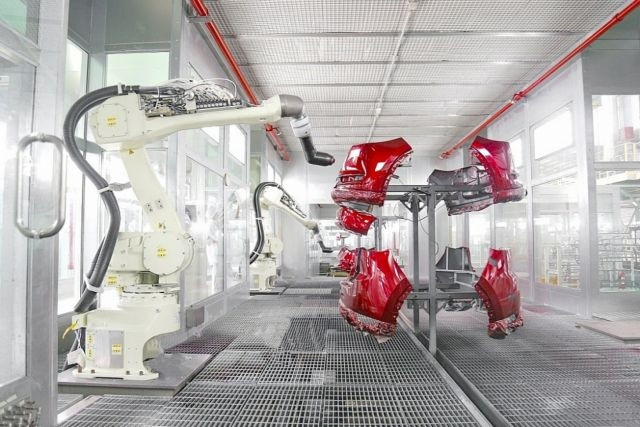 |
| A production line of Việt Nam's THACO AUTO (Automobiles) in Quảng Nam province. - Photo courtesy of haiquanonline |
Việt Nam has made efforts to build a domestic automobile industry, replace imports, and eventually become an auto exporter. However, the young industry faces many challenges, especially in implementing free trade agreements (FTAs), according to the editor-in-chief of Customs Newspaper Vũ Thị Ánh Hồng.
Hồng was speaking during a forum held by the newspaper to discuss how Việt Nam's automobile industry is developing in light of the FTAs.
The government has issued various tax and fee incentives to support the development of a domestic car industry:
- Zero per cent preferential import tax on components imported for domestic automobile production and assembly (2018-2027).
- Tax incentives for the automobile support industry (2020-2024) to ensure the supply of components.
- Reduced special consumption tax rates for battery-powered vehicles compared to gasoline/diesel vehicles.
- Extended deadline for paying special consumption tax on domestically produced/assembled cars until the end of 2023.
- 50% reduction in vehicle registration fees for domestically produced/assembled cars (2020-2023, with consideration for 2024).
- Other incentives on corporate income tax and land use for the automobile industry.
These government policies aim to promote the growth and competitiveness of domestic automobile manufacturing and supporting industries.
Hồng also highlighted the crucial role of customs in facilitating import and export activities, particularly in the automotive industry. By modernising administrative procedures and offering tax incentives, customs aim to create a conducive environment for businesses involved in importing components, raw materials and supplies for automotive production.
She underscored the collaborative efforts between customs and businesses to foster a favorable environment for automotive production and trade, ultimately contributing to the growth and development of the industry.
According to participants, the development of the automobile industry is indeed multifaceted and requires a comprehensive approach beyond just tax incentives. Experts point out various aspects that need attention, such as credit availability, technology levels, technical content, technology transfer, intellectual property costs quality standards, and environmental sustainability.
Nguyen Anh Tuyet, a representative of the Vietnam Automobile Manufacturers' Association (VAMA), said the country has participated in and signed 17 FTAs, many of which include commitments related to completely built-up units (CBU) and roadmaps for cutting import tariffs on CBUs to 0%. She cited the ASEAN Trade in Goods Agreement (ATIGA), the UK - Vietnam FTA, the EU - Vietnam FTA (EVFTA), and the Comprehensive and Progressive Agreement for Trans-Pacific Partnership (CPTPP) as typical examples."This is a huge opportunity for the auto market to diversify products and bring more choices to Vietnamese consumers,” Tuyet said.
She went on to say that right after Vietnam committed to abolish import and export tariffs on goods from ASEAN countries, many domestically produced products are unable to compete with rivals from regional countries such as Thailand or Indonesia.Under the EVFTA, Tuyet went on, the tariff on CBUs imported from the EU will decrease by about 6.4% annually over 10 years. In 2024, it stands at 38.1% and is expected to drop to 0% in 2030.This also puts more pressure on Vietnamese automobile manufacturers when they seek ways to maintain production and market shares in the segments they are present in, the VAMA representative said.
Việt Nam's automobile industry faces stiff competition from regional counterparts like Thailand, Indonesia and China, which have enjoyed a head start in technology and labour development, leading to lower production costs. This competition is further intensified by the implementation of Free Trade Agreements (FTAs), which can potentially put pressure on a local automotive industry if it fails to develop sustainably and implement appropriate strategies.
Le Huy Khoi, Deputy Director of the Vietnam Institute of Strategy and Policy for Industry and Trade under the Ministry of Industry and Trade, said that with quite strong commitments on automobiles, components and spare parts, especially the tariff-related ones, the EVFTA is believed to have a strong impact on Vietnam's automobile industry.
Accordingly, there will be more opportunities to import quality and high-tech cars, spare parts, and components from the EU at lower prices, helping cut production costs and increase vehicles' competitiveness. Besides, Vietnam has chances to export auto and motorbike spare parts and components that it can produce. It can also become investment partners or component suppliers for EU investors who seek to tap into the local and regional markets, he opined.
To address these challenges, Việt Nam has devised a long-term strategic framework for the automobile industry, as outlined in policies such as the 'Strategy for developing domestic automobile industry to 2025, vision to 2045' and subsequent decisions and decrees.
The implementation of tariff reductions under FTAs like the EVFTA and CPTPP will significantly impact the Vietnamese automobile industry.
The effectiveness of government policies and support measures, including those from relevant ministries and branches, in creating favourable and timely conditions for the industry is crucial. Moreover, domestic automobile manufacturers and assemblers need to make concerted efforts to enhance their competitiveness and resilience in the face of global market dynamics and trade agreements.
In discussions among experts, managers and industry stakeholders, key topics should include assessing the current status of Việt Nam's automobile industry development strategy, identifying strengths and weaknesses, pinpointing bottlenecks and formulating solutions to propel industry growth within the framework of free trade agreements. - VNS